Or, in English, Never on Sunday.
In one telling little scene in Pote tin Kyriaki, Greek prostitute Ilia (Melina Mercouri) tells earnest American Grecophile Homer Thrace (Jules Dassin, who also wrote and directed the film) that she is very, very fond of Greek tragedies. In fact, the next performance she’s eager to watch—of Medea—will be the fifteenth time she’ll be watching that particular play. Thrace is surprised, but impressed, too.
… until Ilia, on being invited by her innumerable male friends to tell them the story of Medea, launches forth on a version so garbled and wildly inaccurate that Thrace is left shocked. Not to worry, says a mutual friend, the Captain (Mitsos Ligizos). Ilia likes to be happy; so her interpretation of Medea is tailored to be a happy story, with everybody living happily ever after and going off to the seashore (which is Ilia’s concept of being happy).
Thrace is so stunned, he wastes no time in making sure he accompanies Ilia to the amphitheatre to watch the performance. Medea plays out, as it always does, ending in deep tragedy, and with the audience definitely distressed—all, that is, except Ilia, who smiles dreamily through it all, even bursting into outright laughter now and then.
Because, as she tells Thrace when he questions her later, everything was happy; it all ended well, for the sweet Medea, her husband and her children. But she killed her children, Thrace points out. She actually says so in the play. No, no, replies Ilia, walking happily along; that wasn’t so. That was an excuse to make Jason come back to Medea.
But that’s not logical, Thrace says, in frustration. How can Ilia, a Greek, be illogical?! This is the land of Aristotle, for heaven’s sakes! The man who invented logic!
And Ilia tells him just what she thinks of Aristotle.
This one scene, like several others in the film, offers a good glimpse into the characters of the two main characters of Pote tin Kyriaki. Thrace, the American who has come to Greece with preconceived notions of what Greece and the Greeks should be like: idealistic, beautiful, pure, with a loftiness of values and morals that rises high above the grit and grime of the rest of the world.
On the other hand, Ilia, who is the real face of this utopia Thrace imagines. And yet, not its completely antithesis, either.
But, to begin at the beginning, when we are first introduced to the main characters of Pote tin Kyriaki. This is on a sunny day at the Port of Piraeus, and as the workers work on the boats anchored in the harbour, a slim and carefree figure—that of Ilia—comes running joyfully down the pier, flinging off her shoes and her clothes as she does so, till finally she jumps into the sea with only the bare minimum on.
One newcomer, Tonio (Giorgos Foundas) a half-Italian from Corfu, is immediately fascinated: who is that? he asks the Captain, and is told. Ilia, as Tonio can see for himself, is obviously popular with the men around. Within moments, and in response to her teasing summons, all the workers have deserted their posts and leapt into the water to swim with Ilia. She’s quite something.
When Ilia beckons to him, too, Tonio jumps in as well.
All of this is being watched by Homer Thrace, who’s arriving on a ship steaming into Piraeus right at that moment. Thrace is besotted by ancient Greece and all that it stands for: its philosophy, its culture, its literature—everything. This, he says, as he watches the figures in the water, is the purity of Greece. He can barely wait to disembark and finally get to see it at close quarters.
Sadly for Thrace, his illusions begin to shatter soon enough. The grouchy waiter at the tavern where Thrace steps in for coffee grows even grouchier when Thrace orders coffee (ouzo, says the waiter, is what men drink). A happy drunk, getting up from his chair and dancing, breaking one bottle after another (each of which is immediately rung up on the cash register by the hawk-eyed tavern keeper), gets furious when Thrace claps—so furious, in fact, that he lunges out at Thrace and beats him up, giving him a black eye before help arrives…
… in the form of Ilia. Since she is fairly fluent in English, she sorts out the misunderstanding. This American, she tells the aggrieved drunk dancer Jorgo (Titos Vandis), was appreciating his dancing, not implying that Jorgo was a performer. And, she explains to Thrace, that was why Jorgo got upset: because he thought Thrace was being condescending and sarcastic, implying that Jorgo was dancing to be paid, rather than out of sheer happiness.
Thrace is happy to forgive and forget, because of this fascinating lady. How charming she is, how beautiful, how gracious, how dignified. It’s only a chance remark—and overheard snatches from a quick discussion with two young American sailors who come by to ask Ilia for her time—that alerts Thrace to the truth. Even then he can’t quite believe it, and has to turn to the Captain (who, thankfully, also speaks English) for confirmation.
Oh, Lord. This lovely lady is a whore? Thrace is shattered.
However, after he’s had some time to think over it, he realizes that Ilia is actually a symbol: a symbol of the fall of Greece. Just as Greece declined and fell into ruin, its morals gone down the drain, so it is with Ilia. And it is up to him, Thrace, to bring her back onto the straight and narrow, to elevate her and show her just how gross is the life she leads, the profession she practices.
Which, unknown to an optimistic Thrace right now, is going to be a difficult task to accomplish. Ilia is not just fond of happy endings in Greek tragedy, she is also a genuinely happy person herself. “The sun shines down on me, I am happy,” she explains to him. “I eat a good fish for dinner, I am happy.” Thrace dismisses these as lurid pleasures, all derived from the physical, the sensual. True happiness is happiness of the mind, he tells her, but Ilia is not convinced. She is happy, and she is knows it.
After all, she is the most adored woman in town. All the men like (even love) her; the handsome Tonio, from that very first encounter in the harbour, has swiftly made it obvious that he is completely besotted with Ilia.
The other prostitutes, including her friend Despo (Despo Diamantidou), far from being jealous of her success, look up to her as a leader and an inspiration. The only thorn in Ilia’s side is Mr No Face, the elusive wealthy man who owns all the accommodation occupied by the whores (barring Ilia, who is an independent) and charges them exorbitant rents. Through a shifty-eyed henchman, Mr No Face has been trying to get Ilia to stop working—in effect, to stop giving the other whores ideas.
Ilia can brush off Mr No Face and his man easily; she is confident, self-assured. She has friends. She can choose whom to sleep with—“only if I like you”, she tells a cocky sailor—and she chooses how much she wants to be paid. She is happy. Very. So why should she listen to Thrace? But will Thrace give up so easily?
Various online sources—Wikipedia, IMDB—describe Pote tin Kyriaki as a ‘romantic comedy’, but it’s probably Rotten Tomatoes which comes the closest to describing what this film really is: a ‘philosophical comedy’ is the term they use, and that’s what I thought this was, too. True, the comedy is there. There’s a smidgen of romance too, but not enough to make it really an important element of the plot. What comes through most vividly is the philosophy of it. So many questions, so many things to ponder. Who are we to decide what is best for another person, or what ensures their happiness? Can one not be happy being just what one is, in whatever sordid (sordid, that is, in the eyes of another) circumstances one may live in? Who has the right to try to change another? And why?
What I liked about this film:
Melina Mercouri as Ilia. She got an Oscar nomination for Best Actress for this role (and won Best Actress at Cannes), and she is superb. Ilia is a very well-written character: bold, unfettered, unabashedly sexy. And yet, she is the hooker with a heart of gold: she stands up for her friends, she comforts them, she fights for them, she throws weekly parties for them where she sings and dances and cooks for them. It’s not just her friends, either, who are the recipients of Ilia’s generosity; a virginal young sailor, too nervous to perform when he comes to her bed, finds her not just sympathetic (in a calm, unstressed way) but also, in a fluid, effortless fashion, going about lighting a cigarette, putting on some music, helping him… she’s a good woman, as someone says.
And Melina Mercouri does a magnificent job as Ilia. From seductive to brash, from kind to furious—and a hundred emotions in between—she is unforgettable.
Also unforgettable is the music of the film, by the one and only Hadjidakis. The main song, Ta Pediá tou Pireá, in particular, is a gem (and the winner of the sole Oscar for this film, though it was nominated in several other categories too). I’d grown up listening to the English version of this song (Never on a Sunday) by Connie Francis, then, as a teenager, fell in love with the Greek version sung by Nana Mouskouri—the latter version using not just Hadjidakis’s music, but also the lyrics of the song as sung by Melina Mercouri in the film. Interestingly, the Greek song’s lyrics have nothing to do with the fluffy and relatively meaningless words of the American version: this one is an ode to the Port of Piraeus, to its men and its charm.
Lastly, the feel of the film. The description—a rom-com about an American who tries to reform a free-spirited Greek prostitute—does not do Pote tin Kyriaki justice. Because this is more. It is about the pomposity of a man who lives in some unreal, long-dead (possibly never even existing?) utopia that has little in common with reality. It is about his shock at discovering the sordid truth. And it is about the woman at the receiving end of his missionary zeal to convert her.
Another point worth noting is that the two main characters in the film, even though so vastly different from each other, do not let that difference make them really ill-treat the other person. Thrace may be horrified by Ilia’s obvious enjoyment of her profession, or her lack of awareness of what he thinks is the ‘real Greece’, but he isn’t contemptuous: his misguided attempts to reform her stem from a deep love for this woman. Similarly, even when Thrace is driving Ilia batty, she is magnanimous enough to not hold it against him.
This could have been farcical. On the other hand, it could have been (as several Hindi films have been) melodramatic and weepy. Instead, it manages to be light-hearted yet successful in conveying a message. You have to let people live the lives they choose. And people can be both good and bad, at the same time. Who are we to judge?
Highly recommended (which is why you’ll note that this review doesn’t have a ‘What I didn’t like’ section).
Little bit of trivia:
Jules Dassin wrote the story of Pote tin Kyriaki in an attempt to showcase Melina Mercouri, whom he had fallen in love with (and whom he would go on to marry, in 1966). Besides the more obvious comic, slightly romantic and philosophical tones of the film, another motive for Dassin’s story was to lampoon America’s (and Americans’) fervour in trying to foist American values and philosophies on others, with no respect for the ‘individuality’ of other cultures.
Pote tin Kyriaki, while it was a huge hit with American audiences, drew a lot of flak from the moral police, including the Catholic Church’s Legion of Decency. The fact that a foreign film, and one, too, that did not condemn prostitution (quite the opposite!) got so many Oscar nominations raised a lot of hackles, though, and it’s believed that hectic lobbying resulted in Hadjidakis being the sole Oscar winner for Pote tin Kyriaki.



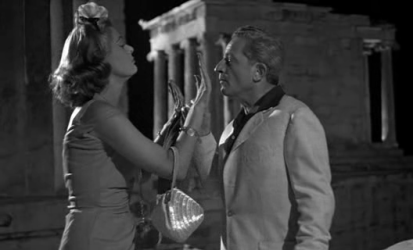



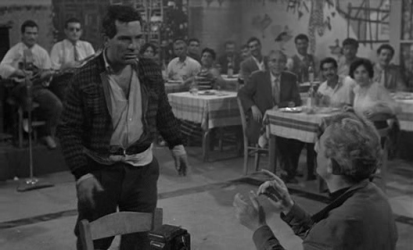

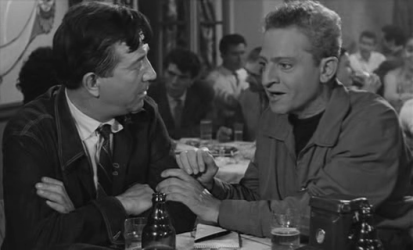

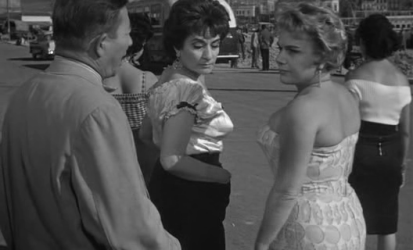

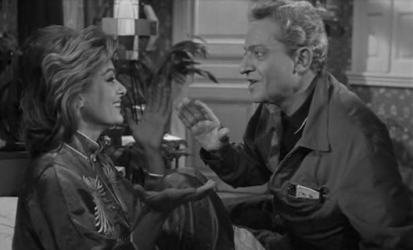
Madhu, Madhu, Madhooooo….. stop, stop, stop…. slow down! :) I can’t keep up with your posts! And I want to see this, now! So, so interesting. I have to go looking for this one.
LikeLike
Good Afternoon dear friend Anu Warrier
Youtuber URL for that movie….
Regards
LikeLike
Thanks, Uma! I searched on YouTube for this movie yesterday and didn’t find anything other than clips.
LikeLike
Good Evening dear friend Anu,
It is on my reply before. Hope you have seen.
Thanks for your response.
Blessings to you.
Uma
LikeLike
You should really watch this one, Anu. It’s very good. :-) Try on Netflix, though, because I had a look through some of the scenes on the Youtube link Uma Maheshwar has provided, and it doesn’t look subbed. Since a good bit of the film is in Greek, you may just miss out on some of it.
LikeLike
Thanks for that, Madhu. Yes, I wouldn’t want to miss anything. I have put it on my Netflix queue, but apparently it’s a ‘long wait’. :(
LikeLike
I’m the same – I can’t bear to miss out on even a bit!
I hope you get to see it sooner than later. :-)
LikeLike
Good Afternoon dear friend ,
Excellent review and well narrated.
Thanks, regards & blessings
LikeLike
Thank you. Glad you liked it.
LikeLike
Of course, I’ve seen the the film. I could only remember it when I read your review. I still remember that scene. But most part of the film I’d totally forgotten. I remembering enjoying the film a lot. I should surely watch it again.
LikeLike
I’m very impressed, Harvey – you seem to have watched so much world cinema! Was that from before you went off to Europe, or is it a result of living in Europe?
And yes, this is worth watching again. Such a good film, enjoyable and with a wise message, too.
LikeLike
I got exposed to European Cinema after I went there. Before that, I remember sleeping through Autumn Sonata, when it was shown on DD.
“Did you watch Autumn Sonata?”, “Nahin, mujhe sona tha.”
There is a good TV channel called ARTE, which shows good, old European films, but also new ones. Some of the avante garde films go over my head or are too bleak.
Pote tin Kyriaki was shown on some other channel and since I saw it in German, I didn’t know that the original was in Greek. Since the film has such an Italian feeling to it, I thought it must have been Italian. Thanks for reminding me of it.
LikeLike
I see. I remember DD showing some foreign films back in the good old days, too – stuff like Red Sorghum went over my head, but I loved Bubbling Springs and The Wedding Day. Other than that, I don’t remember. Most, I think, probably put me to sleep, too. :-)
Now, I don’t know if any TV channels in India show too many foreign films. Perhaps just those which have made an impact abroad, like Amelie or Crouching Tiger Hidden Dragon. Fortunately, several good DVD stores in Delhi have a decent selection of foreign films, including old ones.
LikeLike
‘Who are we to decide what is best for another person’– Very true. Of late I seem to have taken a liking for films which have a story, not all that flash, bang, this Man or that Man stuff. If it has a bit philosophy of life so much the better, something I can relate to. If I like the dialogues in some films, I feel like making a note of it. If I had a film blog I would probably to a list of the most thought provoking dialogues, as for instance one of my favourite dialogues is from the Tom Cruise starrer The Last Samurai, he says “We will do what we have to until destiny reveals itself.” ‘Until Destiny Reveals Itself ‘— that line often plays on my mind when destiny reveals itself to me.
I guess this film falls in that category- that is thought provoking.
LikeLike
Yes, this film is certainly a thought-provoking one. When I first read its synopsis (a short one), I thought it would be a predictable sort of rom-com. It was a refreshing change to see something that was humorous, but had a good message to share too. It’s so easy to judge others and try to change them for what may not be the better, actually!
I haven’t seen The Last Samurai, though my husband praises that film a lot. That dialogue is wonderful, Shilpi. Thanks for sharing it.
LikeLike